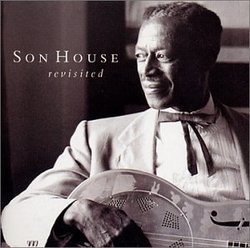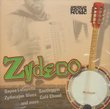| All Artists: Son House Title: Revisited Members Wishing: 1 Total Copies: 0 Label: Varese Sarabande Release Date: 10/22/2002 Album Type: Original recording remastered Genres: Blues, Pop Styles: Delta Blues, Traditional Blues, Acoustic Blues, Slide Guitar Number of Discs: 2 SwapaCD Credits: 2 UPCs: 030206124927, 803680488553 |
Search - Son House :: Revisited
 | Son House Revisited Genres: Blues, Pop
|
Larger Image |
CD DetailsSimilarly Requested CDs
|
CD ReviewsListen and Learn Tony Thomas | SUNNY ISLES BEACH, FL USA | 03/03/2004 (5 out of 5 stars) "Even if he hadn't influenced anyone, even if historically he was a 19 year old kid from Shirley, Long Island, even if this recording at just been waxed last night, this is good, essential blues listening, you won't want to stop listening, you wont stop seeing the scenes of the blues that the songs make, you won't stop swaying at the power and swing of his guitar playing and singing. On here, my song is Preachin the Blues. I know you will have yours.Son House taught Robert Johnson the slide blues. Son House taught Muddy Waters. When Son House started performing at Blues festivals again in the mid 1960s, some of Muddy's younger band members would start to go off for a smoke or whatever when the old man came on stage. Muddy wouldn't let them. Muddy Waters would tell all his band members to be quiet and pay attention when the man played because even compared with Muddy, this was the real deal. Rediscovered in Rochester, New York, relearning to play the guitar, (how this country abuses the masters that come from its people, particularly its Black people), put back on the stage by the folk revival's blues section, House made recordings that reproduced his old masterpies, with a wrier sense of meaning than before.People outside of the blues life focus on the guitar playing or the rhythm of the singing, but where the power comes from is the feeling and the words that are put together, the life and the meaning of the blues. Son House in his youth and his old age, on this and his other sides, always gave it.So Like Muddy Waters, I would like you to know that Son House is the real deal. Listen and learn" Be forewarned- this is a weak live recording Matthew J. Gordon | Collegeville, PA USA | 12/30/2003 (2 out of 5 stars) "I wish I had checked the reviews out at Amazon before I bought this at a record store because the labeling on the CD is very deceiving. Nowhere on the outside does it explain that the 2 CDs are each live recordings, and not very good-quality ones at that (either in sound or performance quality). I figured from the title that they were from his comeback period, so at least that was not a surprise. But a sticker on the package referred to these as "The Seminal Son House recordings", which these are clearly not. When I listened I got very angry at the record company for taking my money with false advertising. Son House sounds drunk and his guitar playing often off-key. The recording of Death Letter Blues shown in the videotaped performance on Scorcese's program was way better, with excellent playing, so I know how great he can be, which makes this set so disappointing. His voice redeems the CDs somewhat because it is still very strong (though still occasionally drunk-sounding), but his too-frequent grunting gets annoying. Also, both CDs are rather short. The talking tracks on the first CD are mildly interesting from a scholarly point of view but I mainly want to hear the music, which could have been combined on one CD. Clearly Son House is a monumental talent, and I don't expect a bluesman like him not to have some rough edges, but unless you are already a Son House fan and want to hear some more historical recordings to complete your collection, I'd stay away from this one. I would give it one star for the deceitful mis-labeling by the record company, but I feel that would be disrespectful to Son House." "I'm just an old ordinary blues player ..." -- Son House Mario Rups | USA | 03/26/2003 (5 out of 5 stars) "An ordinary blues player?? No less an authority than Muddy Waters proclaimed Eddie "Son" House "the greatest of all blues guitarists", and if you don't take his word for it, you certainly wouldn't take mine. I can, however, guarantee that you at least won't find a *better* blues guitarist, or a blues man in general: he was an absolute master of the slide guitar. Son House was already well into his sixties at the time of these recordings -- one at Oberlin, the other at the Gaslight Cafe in New York, both in 1965; note: some songs are repeated -- and his fingers are perhaps not quite as nimble as they once were, but one hardly notices that: the fire burns as brilliantly as it ever did, and his singing is mesmerizing. Along with such luminaries as Charlie Patton and Willie Brown, with whom he played back in the 1930s, House was one of the pioneers of the Delta blues. In the _Revisited_ recordings, you can hear some of his best work -- his "Preachin' Blues", say, based on the old James McCoy version, or his "Empire State Express". The introductory monologues, some of them quite humorous and all of them fascinating, give historical context to the songs and alone serve to commend this double album. Because of the repetition of songs, perhaps this is not the recording to buy as the *only* Son House album you own: you'd want the _Complete Library of Congress Sessions_, say, or the _Original Delta Blues_; but it is definitely worth the listen."
|

 Track Listings (16) - Disc #1
Track Listings (16) - Disc #1
